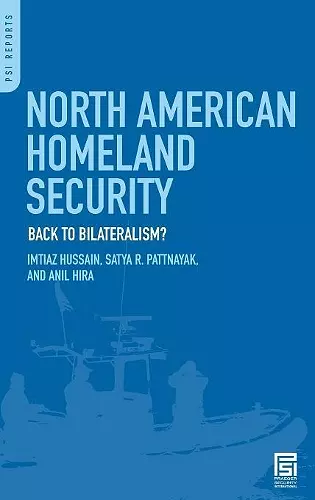North American Homeland Security
Back to Bilateralism?
Anil Hira author Imtiaz Hussain author Satya R Pattnayak author
Format:Hardback
Publisher:Bloomsbury Publishing PLC
Published:30th Oct '08
Currently unavailable, and unfortunately no date known when it will be back

Comparing Canadian and Mexican responses to U..S homeland security imperatives, this volume finds evaporating collective action intensifying regional asymmetry, thereby accenting U.S.-centric bilateralism. Mainstream international relations theories vividly expose, but cannot explain, how a split Canadian/Mexican personality confronting security and economic stimuli deepen theoretical anomie and dramatize underlying incompatibilities.
Did 9/11 revive a North American guns-butter trade-off? Established in the largest administrative overhaul since World War II, the Department of Homeland Security was charged with keeping the United States safe within a wider security community, but confronted the Washington Consensus-based Western Hemisphere free trade movement, beginning with the North American Free Trade Agreement (NAFTA) and extending to the Central American Free Trade Agreement (CAFTA) in 2003, to materialize a Free Trade Area of the Americas (FTAA) compact. Whether 9/11 restrictions impeded these trade-related thrusts or not, embracing neoliberalism permitted Canada and Mexico to pursue their own initiatives, such as proposing free-trade to the US—Canada in 1985, Mexico in 1990, but, as during the Cold War, security imperatives ultimately prevailed.
This work investigates Canada's and Mexico's Department of Homeland Security responses through three bilateral studies of policy responses along comparative lines, case studies of security and intelligence apparatuses in each of the three countries, and a post-9/11 trilateral assessment. Ultimately, they raise a broader and more critical North American question: Will regional economic integration continue to be trumped by security considerations, as during the Cold War era, and thereby elevate second-best outcomes, or rise above the constraints to reassert the unquenchable post-Cold War thirst for unfettered markets replete with private enterprises, liberal policies, and full-fledged competitiveness?
"Topics include how security considerations since the attacks of September 11, 2001, have impeded further economic integration." - The Chronicle Review
"This book is an interesting addition to the growing literature on the nature and effect of security alliances in an economically integrated world… The authors posit that security will trump economic integration for the US and that this reprioritization will increase conflict between social groups within and among states… Recommended. Graduate, faculty, and research collections." - Choice
"How has the security regime established in the United States in the wake of the September 11th, 2001, terrorist attacks impacted trade and other relations between the United States, Canada, and Mexico? Hussain (international relations, U. Iberioamericana, Mexico), Pattnayak (sociology, Villanova U., US), and Hira (Latin American studies, Simon Fraser U., Canada) explore this question by first providing a country-specific study of 9/11 policy responses across North America, then examining the region’s bilateral relations (particularly in reference to security and intelligence), and finally exploring trilateral possibilities. In exploring these issues, they rely on two major of clusters of theories: integrative (security and neofunctionalist) and hybrid (interdependence and neorealism)." - SciTech Book News
ISBN: 9780313356865
Dimensions: unknown
Weight: unknown
344 pages